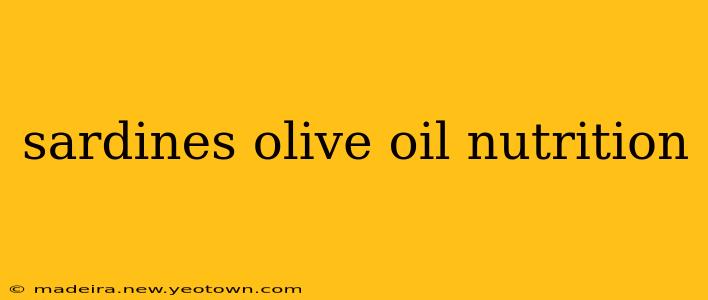The salty tang, the delicate texture, the satisfying crunch – sardines in olive oil are more than just a delicious snack. They're a nutritional powerhouse packed with benefits for your body and mind. This isn't your grandma's canned fish; sardines are experiencing a well-deserved resurgence as a superfood, and for good reason. Let's dive into the incredible nutritional profile of these tiny, mighty fish.
What are the Nutritional Benefits of Sardines in Olive Oil?
Sardines in olive oil boast a remarkable nutrient density. They're a fantastic source of high-quality protein, essential fatty acids, vitamins, and minerals. Think of them as a tiny, edible multivitamin! Let's break down some key components:
-
Omega-3 Fatty Acids: These are the stars of the show. Sardines are exceptionally rich in EPA and DHA, two types of omega-3s crucial for brain health, heart health, and reducing inflammation throughout the body. These fats are vital for cognitive function, reducing the risk of heart disease, and even improving mood.
-
Vitamin D: Often called the "sunshine vitamin," vitamin D is essential for calcium absorption, bone health, and immune function. Many people are deficient in vitamin D, and sardines offer a convenient and delicious way to boost your intake.
-
Vitamin B12: This vitamin is crucial for nerve function, red blood cell formation, and DNA synthesis. Sardines are an excellent source, particularly important for vegetarians and vegans who may struggle to obtain enough B12 from other dietary sources.
-
Calcium and Phosphorus: These minerals are vital for strong bones and teeth. Sardines, especially those with bones included, are a significant source of both. The bones are soft and easily digestible, contributing to your daily calcium needs.
-
Protein: Sardines are a complete protein, meaning they contain all nine essential amino acids your body needs but can't produce on its own. This is crucial for building and repairing tissues, supporting muscle growth, and maintaining overall health.
-
Selenium: This trace mineral acts as a powerful antioxidant, protecting your cells from damage caused by free radicals. It also plays a vital role in thyroid hormone metabolism.
-
Olive Oil Benefits: The olive oil in which the sardines are packed adds another layer of nutritional value. Olive oil is rich in monounsaturated fats, which are linked to heart health, and contains antioxidants that protect against cell damage.
Are Sardines in Olive Oil High in Sodium?
Yes, sardines in olive oil can be relatively high in sodium. This is largely due to the canning process and the addition of salt as a preservative. While the sodium content can vary depending on the brand, it's crucial to be mindful of your intake if you're watching your sodium levels for health reasons. Look for brands that offer lower-sodium options or consider rinsing your sardines before consuming them to reduce the sodium content.
How Many Sardines Should I Eat Per Day?
There's no magic number when it comes to sardine consumption. Moderation is key. A serving of 3-5 sardines provides a significant nutritional boost without overdoing it on sodium or other nutrients. Listen to your body and adjust your intake based on your individual needs and dietary goals.
Are Sardines in Olive Oil Good for Weight Loss?
Yes, sardines can be part of a healthy weight loss plan. Their high protein and healthy fat content help keep you feeling full and satisfied, reducing cravings and potentially aiding in weight management. The combination of protein and healthy fats also supports metabolism and helps regulate blood sugar levels. However, remember that weight loss is a multifaceted process, and sardines alone won't magically melt away the pounds. A balanced diet and regular exercise are crucial components of a successful weight loss journey.
What are the Potential Downsides of Eating Sardines in Olive Oil?
While sardines are incredibly nutritious, potential downsides include:
- High in Purines: For individuals with gout or kidney stones, the high purine content might be a concern.
- Mercury Content: Like other fish, sardines can contain mercury, although generally in low amounts. However, pregnant and breastfeeding women should be mindful of their mercury intake and consult their doctor.
- Allergies: Some individuals are allergic to fish, so it's vital to be aware of potential allergic reactions.
Conclusion:
Sardines in olive oil are a truly remarkable food, offering a wealth of health benefits. From supporting heart health and brain function to boosting your immune system and strengthening bones, these little fish pack a powerful nutritional punch. Incorporate them into your diet as part of a balanced approach to a healthier and happier you. Remember to always check labels and choose brands that align with your dietary needs and preferences.

